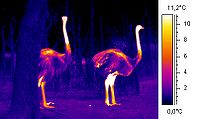
Photo from wikipedia
Thermoregulatory behaviours are of great importance for ectotherms buffering against the impact of temperature extremes. Such behaviours bring not only benefits but also organism level costs such as decreased food… Click to show full abstract
Thermoregulatory behaviours are of great importance for ectotherms buffering against the impact of temperature extremes. Such behaviours bring not only benefits but also organism level costs such as decreased food availability and foraging efficiency and thus lead to energetic costs and metabolic consequences. However, there remains an important gap in our knowledge to link thermoregulatory behaviour to population level ecological consequences. Aphids, as ectothermic invertebrates, can escape from thermal extremes by either dropping off the plant they are on or moving to suitable microclimates. Here we used the English grain aphid, Sitobion avenae, as a model system to test the hypothesis that aphids may behaviourally avoid heat stress while also altering their microhabitat utilization leading to demographic consequences. We found that heat stress drove the aphids to leave their host plant; this reduction in host plant residence was associated with increasing leaf temperatures indicating that aphids exhibit thermoregulatory behaviour to escape heat stress. Specifically, we found that behavioural thermoregulation made the aphids disperse and redistribute themselves within different microclimates and thus led to changes in microhabitat utilization. We also discovered that leaving the host plant during behavioural thermoregulation resulted in a considerable decrease in aphids' survival probability due to their inefficient relocation to other plants and increased risk of starvation. Finally, we found that the aphids' thermoregulatory behaviour prevented heat stress while concurrently resulting in decreased survival and reproduction. Together, these findings support our hypothesis that behavioural thermoregulation alters microhabitat utilization and demographic rates in aphids. This study highlights the importance of behavioural thermoregulation and its ecological consequences and has important implications for understanding population responses in the context of current climate change.
Journal Title: Animal Behaviour
Year Published: 2018
Link to full text (if available)
Share on Social Media: Sign Up to like & get
recommendations!